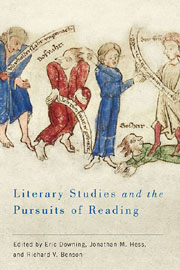Book contents
- Frontmatter
- Contents
- List of Illustrations
- Introduction
- Part I Medieval and Early Modern Practices of Reading
- 1 Apertio Libri: Codex and Conversion
- 2 The Question of Reading and the Medieval Book: Reception and Manuscript Variation of Thomasin's Welscher Gast
- 3 Reading in Nuremberg's Fifteenth-Century Carnival Plays
- 4 Shakespeare, Biblical Interpretation, and the Elusiveness of Meaning
- Part II Reading, Secularization, and Transcendence in the Long Nineteenth Century
- Part III Theories and Practices of Reading in the Twentieth Century and Beyond
- Part IV Postscript: The Ends of Reading
- Works Cited
- Notes on the Contributors
- Index
2 - The Question of Reading and the Medieval Book: Reception and Manuscript Variation of Thomasin's Welscher Gast
from Part I - Medieval and Early Modern Practices of Reading
Published online by Cambridge University Press: 05 February 2013
- Frontmatter
- Contents
- List of Illustrations
- Introduction
- Part I Medieval and Early Modern Practices of Reading
- 1 Apertio Libri: Codex and Conversion
- 2 The Question of Reading and the Medieval Book: Reception and Manuscript Variation of Thomasin's Welscher Gast
- 3 Reading in Nuremberg's Fifteenth-Century Carnival Plays
- 4 Shakespeare, Biblical Interpretation, and the Elusiveness of Meaning
- Part II Reading, Secularization, and Transcendence in the Long Nineteenth Century
- Part III Theories and Practices of Reading in the Twentieth Century and Beyond
- Part IV Postscript: The Ends of Reading
- Works Cited
- Notes on the Contributors
- Index
Summary
A reader, [as opposed to a listener, K.S.] has access to the book as a physical object, in which all the words of a poem coexist at any given moment.… There is no external control over occasion, pace, or emotional response. The poem may be picked up or put down at any time, at any point in the story. It may be read slowly or quickly, one time or many times, from beginning to end or in any other sequence that seems attractive.… A reader has certain options a listener does not: he himself controls the way he receives the poet's poem.
—V. A. Kolve, Chaucer and the Imagery of NarrativeMedieval secular culture was a largely oral one, but in the course of the Middle Ages, literacy penetrated society deeply in Western Europe, eventually emancipating itself from the clerical class. The beginning of the thirteenth century saw a radical rise in the production of vernacular German manuscripts, but the exact relationship between these books and the medieval reception of the poems that they contain has been hotly debated. Did medieval audiences read, listen to, or watch performances of thirteenth-century vernacular German poetry? Were these early manuscripts performance tools or were they privately read? The answers to these questions probably depend on the poet, the audience, the codex, and the particular cultural circumstances. Thirteenth-century German poets composed in a literary context in which orality, aurality, and literacy overlapped, intersected, and coexisted, and they addressed this mixed context of reception in their poems.
- Type
- Chapter
- Information
- Literary Studies and the Pursuits of Reading , pp. 40 - 67Publisher: Boydell & BrewerPrint publication year: 2012



